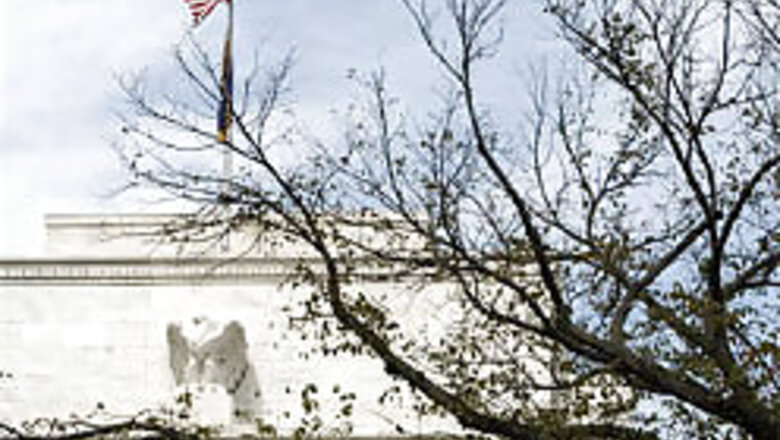
views
Washington: Central banks around the world cut interest rates on Wednesday in their first broadly coordinated policy action in history, as fears of a deep recession banished recent worries over inflation.
In an attempt to stem the worst global financial crisis since the 1930s, the US Federal Reserve, European Central Bank, Bank of England, Switzerland, Canada and Sweden all lowered official rates by a half-percentage point.
But stock markets, traumatised by cascading losses and the collapse of some of the oldest names in banking, took only mild comfort, begging the question of what more policy-makers can do and whether more cuts will follow.
The People's Bank of China, in what appeared to be the first time it had coordinated with the Group of Seven advanced industrial nations, also lowered its key rate, but by a more-modest amount.
The Bank of Japan, with rates at just 0.5 per cent, did not ease monetary policy, but said it strongly supported the coordinated action.
"The recent intensification of the financial crisis has augmented the downside risks to growth and thus has diminished further the upside risks to price stability," the central banks said in a joint statement.
"More may be needed"
The Fed cut the overnight interbank federal funds rate to 1.5 per cent -- the lowest since September 2004 -- from 2.0 per cent.
It also lowered the discount rate it charges on direct loans to bank by a half-point to 1.75 per cent.
The ECB also cut by a half-point to 3.75 per cent as did the Bank of England, taking its rate to 4.5 per cent.
"This is the first such fully coordinated and synchronous rate cut by a number of key central banks," Morgan Stanley economists wrote in a note to clients.
"This is a very important signal to markets and the public at large. Leadership was required, and leadership they showed."
PAGE_BREAK
The Fed and ECB lowered rates on the same day in the aftermath of the September 11 attacks, and the ECB referenced the Fed's action when announcing its own half-point cut.
But there was no joint statement or global dimension to the move as there was with the latest salvo on Wednesday.
China cut its key rate 27 basis points and its reserve requirements for banks by half a percentage point.
"More may be needed ... particularly in Europe," the International Monetary Fund's chief economist, Olivier Blanchard, said at a news conference.
The ECB had raised rates by a quarter point to 4.25 per cent in July, while the Bank of England had held its key borrowing rate at 5.0 per cent since April 10 and the Fed had held still since the end of April.
But shattering losses on property loans and derivative positions by banks in the US and Europe in particular in the past year forced policy-makers to capitulate and put aside inflation concerns in the interest of economic growth.
"It's a very important mark of intimate cooperation and an important mark of confidence," ECB President Jean-Claude Trichet told Reuters Television.
British Prime Minister Gordon Brown separately urged further steps to guarantee interbank lending.
According to a G7 source, Brown called for national guarantees to restore trust between banks in a letter sent to the governments of major economies.
Finance ministers and central bank chiefs from the Group of Seven -- the United States, Japan, Britain, Canada, Italy, Germany and France - meet in Washington on Friday. French President Nicolas Sarkozy, current holder of the European Union's rotating presidency, said in Evian that the EU was working on coordinated measures and promised swift action.
Using every tool
The central banks' rate cuts follow months in which they had injected hundreds of billions of dollars into credit markets to try to prevent them from freezing entirely as mortgage-related losses at banks mounted.
Stock markets in Europe closed with heavy losses, and Wall Street suffered wild swings.
PAGE_BREAK
By mid-afternoon, the Dow Jones industrial average was up about 15 points after having shed 230 points at one stage. MSCI's benchmark world index was down 3.7 per cent, while the pan-European FTSEurofirst 300 closed down 6.3 per cent.
Beyond bail outs
Governments have been frantically bailing out banks to keep them afloat.
The Bank of England praised the British government's plan, announced on Tuesday, to boost bank liquidity, saying rate cuts would not be enough to end the crisis.
The Fed said that while inflation has been high, recent declines in commodity prices had tempered inflation risks.
"Incoming economic data suggests that the pace of economic activity has slowed markedly in recent months," it said.
"Moreover, the intensification of financial market turmoil is likely to exert additional restraint on spending, partly by further reducing the ability of households and businesses to obtain credit," the Fed added.
Hong Kong earlier slashed the borrowing rate it charges banks by a full percentage point, a day after Australia's central bank delivered its biggest interest rate cut in 16 years, also a full point.




















Comments
0 comment